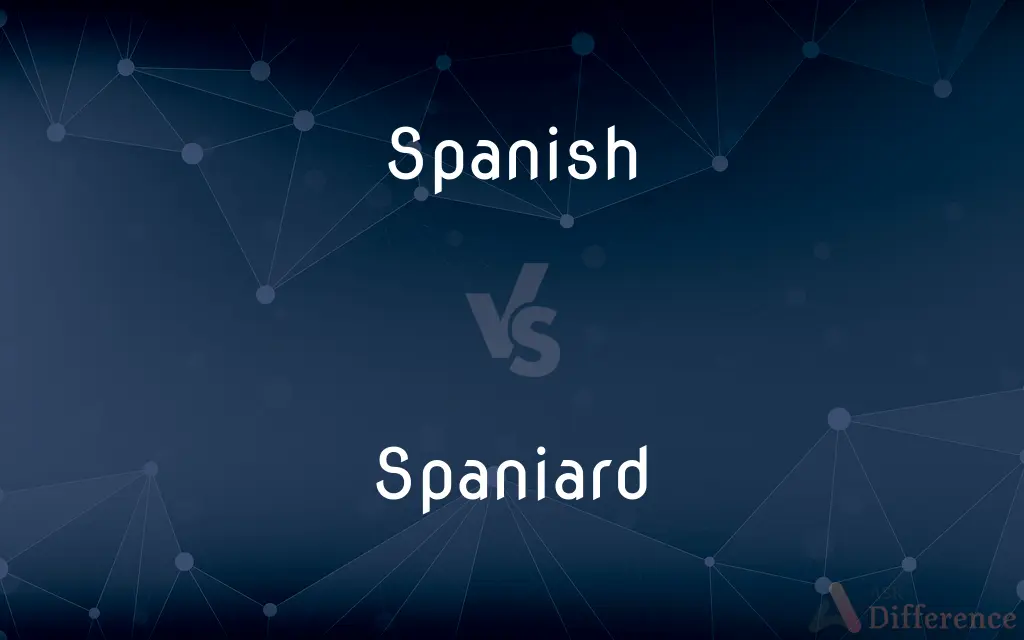Spanish vs. Spaniard — What's the Difference?
By Urooj Arif & Fiza Rafique — Updated on March 27, 2024
"Spanish" refers to the language spoken in Spain and several Latin American countries or relates to Spain and its culture, while "Spaniard" specifically denotes a person from Spain.

Difference Between Spanish and Spaniard
Table of Contents
ADVERTISEMENT
Key Differences
"Spanish" is an adjective and a noun, primarily used to describe the language derived from Latin, spoken by over 400 million people worldwide. As an adjective, it pertains to anything related to Spain, its people, culture, or language. For example, Spanish cuisine, Spanish customs, or the Spanish language itself are all facets under the term "Spanish." On the other hand, "Spaniard" is a noun that identifies a person of Spanish nationality or origin, focusing solely on the demographic aspect rather than the linguistic or cultural dimensions.
While "Spanish" can broadly encompass any element related to Spain, including language and cultural practices, "Spaniard" narrows the focus exclusively to the people of Spain. This distinction is crucial in conversations and writings that deal with the diverse aspects of Spain and its global influence. For instance, discussing "Spanish influence in the Americas" could involve language, architecture, and cultural practices brought by Spaniards, whereas mentioning "Spaniards in the Americas" would specifically refer to the individuals from Spain who lived or currently live in the Americas.
The term "Spanish" as it relates to language, serves as a bridge connecting various cultures across the world that share the language, transcending geographical boundaries. However, "Spaniard" emphasizes the unique identity and nationality of the people from Spain, distinguishing them from other Spanish-speaking communities globally.
In academic and formal contexts, the accurate use of "Spanish" and "Spaniard" is important for clarity and precision. Misusing these terms could lead to confusion, especially when distinguishing between the cultural, linguistic, or ethnic aspects related to Spain and its people. For example, when discussing the global spread of the Spanish language, one would refer to "Spanish-speaking countries," but when focusing on the migration patterns of people from Spain, the term "Spaniards abroad" would be more appropriate.
Comparison Chart
Definition
Refers to the language of Spain or relates to Spain and its culture.
Specifically denotes a person from Spain.
ADVERTISEMENT
Usage
As an adjective and a noun for language and cultural aspects.
As a noun for people of Spanish nationality or origin.
Focus
On language, culture, or anything related to Spain.
Solely on the demographic aspect—people from Spain.
Global Context
Links cultures across the world that share the Spanish language.
Emphasizes the unique identity and nationality of people from Spain.
Examples
Spanish cuisine, Spanish flu, Spanish language.
Famous Spaniards include artists like Pablo Picasso and Salvador Dalí.
Compare with Definitions
Spanish
Relating to Spain or its culture, people, or language.
The Spanish festival was filled with traditional music and dance.
Spaniard
Used in contexts focusing on the demographic aspect of Spain.
Spaniards are known for their lively festivals and traditions.
Spanish
A Romance language primarily spoken in Spain and the Americas.
She is studying Spanish to communicate better with her clients in Latin America.
Spaniard
Refers specifically to individuals from Spain.
The group included a Spaniard who shared stories of life in Madrid.
Spanish
Refers to the people of Spain collectively, without specifying individual identities.
The Spanish have a rich history of explorations.
Spaniard
A native or citizen of Spain.
The Spaniard moved to the United States for work.
Spanish
Pertaining to items or concepts originating from Spain.
They enjoyed a Spanish wine with their meal.
Spaniard
Someone of Spanish descent or nationality.
As a Spaniard, she takes pride in her country's artistic heritage.
Spanish
Connected with the influence of Spain globally.
Spanish colonial architecture is evident in many cities across the Americas.
Spaniard
Denotes a person's link to Spain by birth or citizenship.
The Spaniard represented his country in the international conference.
Spanish
Relating to Spain, its people, or its language.
Spaniard
A native or inhabitant of Spain, or a person of Spanish descent.
Spanish
The people of Spain.
Spaniard
A spiny rock plant of the parsley family, native to New Zealand.
Spanish
A Romance language spoken in Spain and in much of Central and South America (except Brazil) and several other countries. It is the second most widely spoken first language in the world, with more than 400 millon speakers.
Spaniard
A native or inhabitant of Spain.
Spanish
Of or relating to Spain or its people or culture.
Spaniard
A person of Spanish ancestry.
Spanish
Of or relating to the Spanish language.
Spaniard
A native or inhabitant of Spain.
Spanish
The Romance language of the largest part of Spain and most of Central and South America.
Spaniard
A native or inhabitant of Spain
Spanish
(used with a pl. verb) The people of Spain.
Spanish
(printing) To subject to spanishing, a printing process in which an ink is deposited on the bottoms and sides of depressions formed in a plastic material
Spanish
Of or pertaining to Spain or the Spaniards.
Spanish
The language of Spain.
Spanish
The Romance language spoken in most of Spain and the countries colonized by Spain
Spanish
The people of Spain
Spanish
Of or relating to or characteristic of Spain or the people of Spain;
Spanish music
Common Curiosities
Can "Spanish" refer to people from Spain?
Yes, but in a general sense, referring collectively to the people, unlike "Spaniard," which refers to individuals.
Is "Spanish" only used to describe the language?
No, it also describes anything related to Spain, including its culture, traditions, and people in a collective sense.
Can someone who speaks Spanish automatically be considered a Spaniard?
No, speaking Spanish does not make someone a Spaniard, which specifically refers to people of Spanish nationality or origin.
Do Spaniards only come from mainland Spain?
"Spaniard" includes individuals from all parts of Spain, including its islands and autonomous regions, not just the mainland.
How does the global context affect the use of "Spanish" and "Spaniard"?
"Spanish" has a broader global context linking various cultures through language, whereas "Spaniard" focuses on the identity and nationality of people from Spain.
Is the term "Spanish" used differently in Spain compared to other Spanish-speaking countries?
While the basic meaning remains the same, local contexts might influence specific uses, especially in cultural or regional distinctions.
What is the difference between Spanish and Spaniard?
"Spanish" can refer to the language or anything related to Spain's culture, while "Spaniard" specifically denotes a person from Spain.
Can the use of "Spanish" versus "Spaniard" affect the perception of a statement or text?
Yes, using one term over the other can significantly influence the perception of a statement, indicating whether it refers broadly to cultural and linguistic aspects or specifically to the people of Spain.
How do Spaniards feel about the global spread of the Spanish language?
While opinions vary, many Spaniards take pride in the global spread of the Spanish language, viewing it as a bridge that connects Spain with cultures worldwide.
Why is it important to distinguish between Spanish and Spaniard?
Accurate use distinguishes between the cultural, linguistic, and ethnic aspects related to Spain and its specific reference to individuals from Spain.
Can "Spanish" describe anything made in Spain, like products or art?
Yes, "Spanish" can be used to describe products, art, or anything originating from Spain, emphasizing its national or cultural origin.
In what contexts might the distinction between "Spanish" and "Spaniard" be particularly important?
The distinction is crucial in academic, cultural, and diplomatic contexts where accurate identification of nationality, language, or cultural heritage is important.
Does the term "Spaniard" include people from Spanish-speaking countries in Latin America?
No, "Spaniard" specifically refers to individuals from Spain. People from Spanish-speaking countries in Latin America are not called Spaniards.
Share Your Discovery

Previous Comparison
Part vs. Element
Next Comparison
Seraglio vs. HaremAuthor Spotlight
Written by
Urooj ArifUrooj is a skilled content writer at Ask Difference, known for her exceptional ability to simplify complex topics into engaging and informative content. With a passion for research and a flair for clear, concise writing, she consistently delivers articles that resonate with our diverse audience.
Co-written by
Fiza RafiqueFiza Rafique is a skilled content writer at AskDifference.com, where she meticulously refines and enhances written pieces. Drawing from her vast editorial expertise, Fiza ensures clarity, accuracy, and precision in every article. Passionate about language, she continually seeks to elevate the quality of content for readers worldwide.
















































